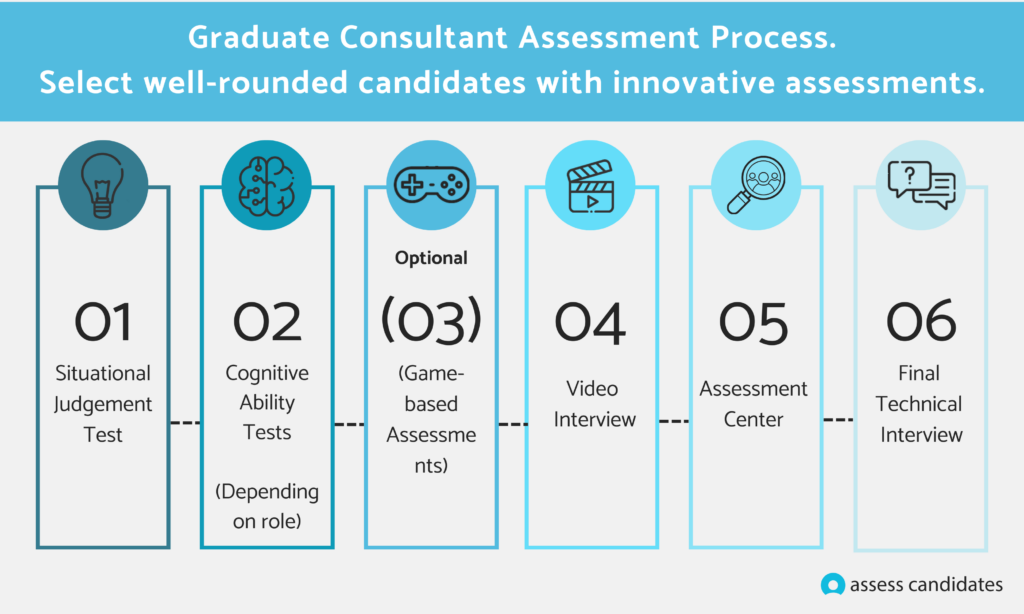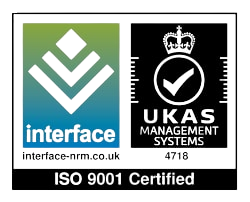Hiring for Graduate Consultants: Why this pre-employment assessment process should be adopted
A Graduate Consultant is one of the most popular graduate roles. As recruiters, how can you ensure you hire the right Graduate Consultant for your company and industry? In this short piece, we outline best practice for hiring a Graduate Consultant and recommend an innovative and reliable assessment process which will select well-rounded and best-fit candidates.
Contents:
- What is a Graduate Consultant and what do they do?
- What is the ideal assessment process to hire the right Graduate Consultant?
- Concluding remarks
1. What is a Graduate Consultant and what do they do?
How does a Graduate Consultant fit into my organization?
A Graduate Consultant is a trainee consultant role, often part of a structured graduate scheme offered by consultancy firms and similar organizations. Most schemes will firstly place graduates in broader Management Consultancy roles, before they have the opportunity to branch out and specialize in diverse areas, such as Engineering, Finance or IT Consultancy.
What would be the roles and responsibilities of a Graduate Consultant for my organization?
Graduate Consultants are expected to assist in understanding the complex processes and issues in a client’s company to subsequently provide viable solutions that help optimize their business across operations, strategy, people, finances, and technology.
Common responsibilities include:
- Conducting research and fact-finding
- Collating and analyzing key data
- Preparing briefing materials and proposals for senior consultants and their teams
- Writing up findings into presentations
- Planning and problem-solving to create the best solutions and recommendations for clients
- Communicating with and updating clients
- Monitoring the progress of solutions

What skills are needed for a Graduate Consultant to succeed in my organization?
To be a successful Graduate Consultant, there are numerous cognitive and soft skills and attributes which are required. These are:
- Problem-solving skills
- Analytical skills
- Critical thinking skills
- Teamwork skills
- Interpersonal and communication skills
- Attention to detail
- Commercial awareness
- Curiosity
- Adaptability
- Organizational skills
- Ability to listen and persuade
- Project management skills
When recruiting for a Graduate Consultant, these core skills should be carefully assessed.
Create a hiring assessment process for your Graduate Consultant role. Fast. Hire For Free
2. What is the ideal assessment process to hire the right Graduate Consultant?
When hiring for a Graduate Consultant role, as recruiters, it can be difficult to implement a recruitment process that tests candidates against the wide range of skills and competencies required for consultancy. CVs and Cover Letters won’t be much use. That is why systematic and robust assessments are key to selecting the right candidates first time.

1. A Pre-employment Situational Judgement Test
At the first stage of assessment for the Graduate Consultant role, it is best practice to present candidates with specific work-based scenarios as part of a pre-employment situational judgement test. This assessment requires candidates to select what they believe is the best and worst course of action, and thus, provides accurate insight into their authentic behavioral competencies and core strengths.
What’s more, the Graduate Consultant situational judgement test can be customized to reflect work-based scenarios and challenges faced specifically in consulting roles or within your own organization. It can also be tailored to only assess the specific competencies required for a Graduate Consultant.
Graduate Consultant competencies may include:
- Problem-solving skills
- Critical thinking
- Teamwork
- Communication
- Commercial awareness
- Curiosity
- Project management skills
The Graduate Consultant situational judgement test can accurately predict candidates’ job performance and role suitability due to its flexibility and versatility.
2. Pre-employment Aptitude Tests
Depending on the consulting role and/or specialist area, we also recommend at this initial sifting stage to combine the situational judgement test with other skills-based aptitude tests for recruitment. These could include:
- Pre-employment numerical reasoning assessments
- Pre-employment verbal reasoning assessments
- Pre-employment logical reasoning tests
For some Graduate Consultants roles, it’s essential to assess candidates’ numerical ability and analytical skills, while for other roles, it’s key to test candidates’ mental agility, critical thinking and/or interpersonal and communication skills.
A combination of skills-based aptitude assessments will quickly and accurately paint a well-rounded picture of candidates and help you select those with the desired skills for the consulting role and who should pass onto the next stage of recruitment.
Did you know that if you combine aptitude tests at the initial stage of Graduate Consultant assessment, you could reduce your candidate pool by 50%? This is particularly beneficial for any graduate scheme recruitment to speed up sifting through the high volume of applications.
3. Game-based Assessments
If application withdrawals have been a problem for your hiring team in the past or sustaining candidate engagement is a present priority, it would be a good idea to consider adding one or a couple of pre-employment game-based assessments to your Graduate Consultant assessment process.
Why should I use Game-based Assessments in my Graduate Consultant hiring process?
Non-timed game-based assessments for recruitment have soared in popularity in recent years, especially within the consulting industry, as they are a modern, fun, interactive, and effective way to engage candidates early on and reduce candidate stress and anxiety. The inclusion of games also enhances your company image as innovative and dynamic, which helps you stand out against the competition.
There are multiple game-based assessments for consulting, which will supplement and enhance the insight already gained from the pre-employment situational judgement test and traditional aptitude tests. These include:
- The i-EQ™ Game: measures emotional intelligence and sociability
- The MTA-Tray™ Game: measures organizational skills, ability to prioritize, and attention to detail
- The Cognition-A™ Game: measures cognitive ability in attention
- The BART Game: measures risk-taking and emotionality
4. A Pre-hire Video Interview
For the next stage in hiring your Graduate Consultants, we suggest asking candidates to take a timed video interview so that you can learn more about who they are, their experience, and what motivates them.
In this Graduate Consultant video interview, questions could be biological and related to candidates’ CV and background or competency-based, such as ‘Tell me about a time you disagreed with a teammate?’.
Keep in mind to look out for evidence of what candidates do well to make sure they are a good fit for your organization.
5. An Assessment Center
For the penultimate stage of your recruitment assessment process for a Graduate Consultant, it is recommended to invite the remaining candidates to a virtual or in-person assessment center.
How should I set up an Assessment Center for my Graduate Consultant role?
The Graduate Consultant assessment center should involve a variety of different exercises, such as group discussion, role-play, and presentation. As assessors, you should observe candidates’ strengths and weaknesses, how well they work within a team, react to and analyze new information, and deal with time pressures.
The exercises are designed to help you make informed decisions regarding which candidates are the best fit for the consulting role, team, and company culture, as well as to give candidates a taster of daily situations consultants face to see if you are the right employer for them.
6. A Technical Final Interview
The final assessment stage for the majority of Graduate Consultant programmes will be a technical interview with senior consultants and/or managers from the relevant specialist area. This presents the opportunity to cover and assess more technical aspects, such as analytical and strategic skills and business acumen.
It is best practice to structure this technical interview as a case-study, in which final candidates are required to analyze a business case, formulate viable solutions to the challenge, and present recommendations. Often, there are no right or wrong answers, but rather the primary goal is to gauge how candidates rationalize information and make a strong business case for their recommendations under time constraints.
3. Concluding remarks
By incorporating these 5 assessment stages into your Graduate Consultant recruitment process, you will firstly be able to sift out large volumes of applicants. Additionally, you will gain comprehensive well-rounded insight into candidates’ technical skills, competencies, and overall fit for the consulting role and organization. This insight will subsequently enable you, as recruiters, to hire the right Graduate Consultant first time.
Interested in getting the latest insights and advice on candidate assessment? Sign up with your email below to get started.
